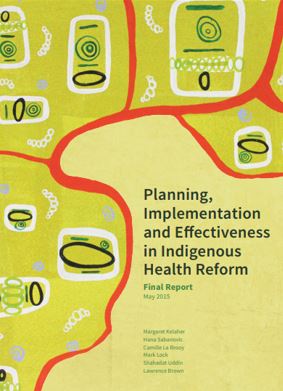Planning, implementation and effectiveness in Indigenous health reform
-
Project Leader

Prof. Margaret Kelaher
Project Details
Aims
The aims of the PIE project were to identify:
- the processes through which Aboriginal and Torres Strait Islander community members and organisations are involved in governance;
- the impact of their engagement on decisions and relationships with others;
- the aspects of engagement that are associated with:
- greater satisfaction with the process
- greater confidence in implementation
- improvements in access to health services.
Methods
The approach to the PIE study involved seven key stages:
- development of a research framework
- establishment of a project reference group
- ethics approval and consent process
- collection of interview and survey data from forum members
- analysis
- regional reporting and feedback
- final report and recommendations.
Findings
Overall, the findings suggest that the incorporation of Aboriginal and Torres Strait Islander communities and organisations in regional planning plays an important role in improving health equity. Achieving this requires strong links between Aboriginal organisations and mainstream organisations and between Aboriginal organisations. The study makes an important contribution to understanding the processes through which the incorporation of disenfranchised groups into governance might contribute to health equity. It has highlighted the potential role of social networks in the processes. Furthermore, it has advanced the understanding of the relationship between governance and outcomes in primary care. The incorporation of Aboriginal and Torres Strait Islander communities and organisations in governance plays an important role in improving satisfaction with planning processes and the outcomes of health programs. This suggests three main recommendations, and further emanating from these.
Recommendations
- Recommendation 1: The incorporation of Aboriginal and Torres Strait Islander communities and organisations in the governance of health programs should be further supported and developed.
- Recommendation 2: Governance processes should include mechanisms to ensure that perspectives of Aboriginal and Torres Strait Islander participants are valued and inform decision making.
- Recommendation 3: Future interventions should consider where relationships between organisations need further strengthening and should develop strategies/activities to achieve this. The implementation of the IHNPAs was associated with a significant shift in power from central Recommendations government to regional forums comprising local health service providers and community groups. Regional forums, for the most part, provided an effective platform to involve Aboriginal and Torres Strait Islander people and organisations in governance. The results show that the interorganisational networks formed in the context of these forums influenced improvements in access to health services as a result of the IHNPAs. Two further recommendations are associated with this.
- Recommendation 4: Support for the role of regional forums with the continuation of regional approaches to planning and funding for secretariats should be continued.
- Recommendation 5: The equity of processes to select projects for funding in order to ensure an optimal regional service mix should be improved. Measures to achieve this should include: a providing support in proposal development b ensuring that data on performance is considered in decision making c identifying ways in which potentially competing organisations can work together. A number of complexities were involved in coordinating IHNPA activities across national, State and regional levels. Working with tripartite forums was seen as an effective mechanism to offer State-wide and national solutions to advance Aboriginal and Torres Strait Islander health. A strong feeling that regional forums were under-utilised as a mechanism for co-ordination and communication was also apparent and led to a further recommendation.
- Recommendation 6: State-level (tripartite) and regional planning forums should be used as a means to improve communication and co-ordination between different programs.
Researchers
Professor Margaret Kelaher
Hana Sabanovic
Dr Camille La Brooy
Dr Mark Lock
Dr Shahadat Uddin
Mohammad Khan
Mr Arif Khan
Dr Jasmina Brankovich
Mr Ron Gidgup
Professor Lawrence Brown
Research Outcomes
https://www.sciencedirect.com/science/article/pii/S0277953614004614?via%3Dihub
https://www.lowitja.org.au/sites/default/files/docs/PIE-Report-layout-WEB_0.pdf
https://www.lowitja.org.au/sites/default/files/PIE-Report-PB-FINAL2.pdf
Research Group
Key Contact
For further information about this research, please contact the research group leader.
Department / Centre
MDHS Research library
Explore by researcher, school, project or topic.
